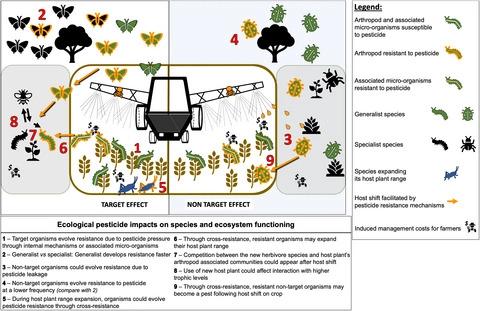当前位置:
X-MOL 学术
›
Ecol. Lett.
›
论文详情
Our official English website, www.x-mol.net, welcomes your
feedback! (Note: you will need to create a separate account there.)
Pesticide resistance in arthropods: Ecology matters too
Ecology Letters ( IF 7.6 ) Pub Date : 2022-06-21 , DOI: 10.1111/ele.14030 Audrey Bras 1, 2 , Amit Roy 2 , David G Heckel 3 , Peter Anderson 1 , Kristina Karlsson Green 1
Ecology Letters ( IF 7.6 ) Pub Date : 2022-06-21 , DOI: 10.1111/ele.14030 Audrey Bras 1, 2 , Amit Roy 2 , David G Heckel 3 , Peter Anderson 1 , Kristina Karlsson Green 1
Affiliation

|
Pesticide resistance development is an example of rapid contemporary evolution that poses immense challenges for agriculture. It typically evolves due to the strong directional selection that pesticide treatments exert on herbivorous arthropods. However, recent research suggests that some species are more prone to evolve pesticide resistance than others due to their evolutionary history and standing genetic variation. Generalist species might develop pesticide resistance especially rapidly due to pre-adaptation to handle a wide array of plant allelochemicals. Moreover, research has shown that adaptation to novel host plants could lead to increased pesticide resistance. Exploring such cross-resistance between host plant range evolution and pesticide resistance development from an ecological perspective is needed to understand its causes and consequences better. Much research has, however, been devoted to the molecular mechanisms underlying pesticide resistance while both the ecological contexts that could facilitate resistance evolution and the ecological consequences of cross-resistance have been under-studied. Here, we take an eco-evolutionary approach and discuss circumstances that may facilitate cross-resistance in arthropods and the consequences cross-resistance may have for plant–arthropod interactions in both target and non-target species and species interactions. Furthermore, we suggest future research avenues and practical implications of an increased ecological understanding of pesticide resistance evolution.
中文翻译:

节肢动物的抗药性:生态也很重要
农药抗性的发展是当代快速进化的一个例子,它给农业带来了巨大的挑战。它通常是由于农药处理对食草节肢动物施加的强烈定向选择而演变的。然而,最近的研究表明,由于它们的进化历史和遗传变异,某些物种比其他物种更容易产生抗药性。由于预适应处理多种植物化感化学物质,多面手物种可能特别迅速地产生农药抗性。此外,研究表明,适应新的寄主植物可能会增加对农药的抵抗力。需要从生态学角度探索寄主植物范围进化与农药抗性发展之间的这种交叉抗性,以更好地了解其原因和后果。然而,许多研究都致力于农药抗性的分子机制,而可能促进抗性进化的生态环境和交叉抗性的生态后果都没有得到充分研究。在这里,我们采用生态进化方法并讨论可能促进节肢动物交叉抗性的情况以及交叉抗性可能对目标和非目标物种以及物种相互作用中的植物-节肢动物相互作用产生的后果。此外,
更新日期:2022-06-21
中文翻译:

节肢动物的抗药性:生态也很重要
农药抗性的发展是当代快速进化的一个例子,它给农业带来了巨大的挑战。它通常是由于农药处理对食草节肢动物施加的强烈定向选择而演变的。然而,最近的研究表明,由于它们的进化历史和遗传变异,某些物种比其他物种更容易产生抗药性。由于预适应处理多种植物化感化学物质,多面手物种可能特别迅速地产生农药抗性。此外,研究表明,适应新的寄主植物可能会增加对农药的抵抗力。需要从生态学角度探索寄主植物范围进化与农药抗性发展之间的这种交叉抗性,以更好地了解其原因和后果。然而,许多研究都致力于农药抗性的分子机制,而可能促进抗性进化的生态环境和交叉抗性的生态后果都没有得到充分研究。在这里,我们采用生态进化方法并讨论可能促进节肢动物交叉抗性的情况以及交叉抗性可能对目标和非目标物种以及物种相互作用中的植物-节肢动物相互作用产生的后果。此外,











































 京公网安备 11010802027423号
京公网安备 11010802027423号